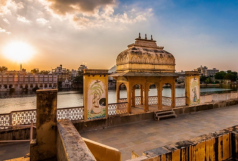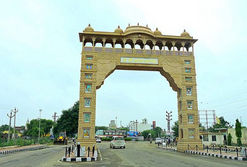Sustainable Tourism in Rajasthan: Eco-friendly Travel Tips
Rajasthan is one of India’s most iconic travel destinations, renowned for its rich history, majestic forts, and vibrant culture. However, with the rise in tourism, the environmental impact on its delicate ecosystems has become more apparent. To ensure that future generations can continue to enjoy the beauty and grandeur of this royal state, sustainable tourism is the need of the hour. This guide provides eco-friendly travel tips to help you enjoy your Rajasthan tour while minimizing your environmental footprint.
1. Choose Eco-Friendly Accommodations
When planning your Rajasthan tour package, opt for eco-friendly hotels and resorts. Many hotels in Rajasthan have adopted sustainable practices, such as using solar energy, rainwater harvesting, and waste recycling. Staying in these accommodations supports businesses that prioritize sustainability while allowing you to enjoy a comfortable stay without compromising on the environment.
2. Reduce Plastic Usage
One of the easiest ways to travel sustainably is to minimize plastic use. Carry a reusable water bottle and refill it at filtered water stations available at many tourist locations and accommodations. Avoid purchasing plastic bottles and packaged food that contribute to the growing waste problem. Carrying reusable shopping bags and eco-friendly toiletries is another excellent way to reduce plastic waste while traveling in Rajasthan.
3. Support Local Businesses
While exploring the best places in Rajasthan, make it a point to shop from local artisans and markets. Buying handcrafted items from local artisans not only reduces the carbon footprint associated with mass-produced goods but also supports the local economy. Rajasthan is known for its traditional handicrafts, textiles, and jewelry, so shopping locally can give you a more authentic experience while contributing to the preservation of the region's cultural heritage.
4. Use Public Transport or Carpool
When moving between destinations like Jaipur, Jodhpur, Udaipur, and Jaisalmer, consider using public transport or carpooling services. Rajasthan has a robust public transport system, including buses and trains, which offer a more eco-friendly alternative to private taxis. If public transport is not an option, opt for carpooling with other travelers to reduce emissions. This will not only reduce your carbon footprint but also allow you to connect with fellow tourists.
5. Conserve Water
Rajasthan is a desert state, and water conservation is critical. Many areas face water shortages, especially during the summer months. Be mindful of your water usage during your trip by taking shorter showers, reusing towels, and avoiding unnecessary water waste. Staying in accommodations that use water-saving technologies like low-flow showers and dual-flush toilets can also make a significant difference.
6. Participate in Local Conservation Initiatives
Many regions in Rajasthan are home to delicate ecosystems and endangered wildlife. When visiting national parks like Ranthambore or Sariska, ensure that you follow guidelines to protect the environment and wildlife. Some tour operators offer eco-tourism initiatives where part of the profits go toward conservation projects. By choosing to participate in these activities, you can contribute to preserving Rajasthan's natural beauty.
7. Avoid Wildlife Exploitation
Rajasthan is home to a variety of wildlife, from majestic tigers to migratory birds. While wildlife tourism is a significant attraction, it’s essential to choose ethical wildlife tours. Avoid tours that promote animal exploitation, such as elephant rides or circuses that mistreat animals. Instead, visit national parks and wildlife sanctuaries where you can observe animals in their natural habitats, contributing to their protection.
8. Respect Local Cultures and Communities
Respect for local cultures and traditions is a cornerstone of sustainable tourism. Rajasthan is a culturally diverse state with distinct customs and practices. While visiting rural areas and historic landmarks, be mindful of local customs. Dress modestly when visiting religious sites, ask for permission before photographing locals, and support community-led tourism initiatives. Engaging respectfully with local communities can foster mutual understanding and help preserve their cultural identity.
9. Take Only Memories, Leave Only Footprints
One of the golden rules of sustainable travel is to leave places better than you found them. Avoid littering and take all your waste with you when visiting tourist spots, natural reserves, or even urban attractions. Use designated trash and recycling bins, and avoid disturbing the natural landscape. By being a responsible traveler, you can help protect Rajasthan's beautiful environment for future generations.
10. Sustainable Souvenirs
When buying souvenirs, opt for eco-friendly products made from sustainable materials. Rajasthan is famous for its handicrafts, including pottery, textiles, and leather goods. Choose items that are made by local artisans using traditional methods, ensuring that your purchases have a positive impact on both the environment and the local economy. Avoid buying products made from endangered species or harmful materials.
Conclusion
Practicing sustainable tourism in Rajasthan is about making conscious choices that benefit both the environment and local communities. From choosing eco-friendly accommodations to supporting local businesses and conserving water, each small action can have a lasting impact. As you explore the royal palaces, ancient forts, and colorful markets of Rajasthan, remember to tread lightly and leave a positive mark on this extraordinary state.
By following these eco-friendly travel tips, you can enjoy a fulfilling and memorable Rajasthan tour while ensuring that its cultural and natural beauty remains intact for future generations. Book your Rajasthan tour package with sustainability in mind and embark on a journey that respects both people and the planet!























